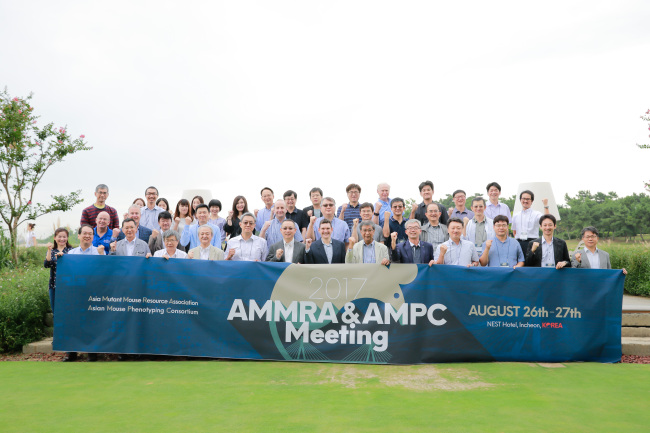KMPC aims to build infrastructure for gene function analysis
By Korea HeraldPublished : Feb. 22, 2018 - 16:55
The Korea Mouse Phenotype Consortium is seeing the fruits of its efforts to discover and interpret human gene functions.
The KMPC helped a breakthrough in the field of genetics as part of the International Mouse Phenotype Consortium, which published its research on “Nature Genetics” in June 2017. The study revealed previously unknown functions of 3,328 human genes that traditional genetic testing could not identify.
Professor Seong Je-kyung from Seoul National University, who is the director of the KMPC, and Cho Soo-young, a researcher from the National Cancer Center, took part in the study, funded by Korea’s Ministry of Science and ICT.
Whereas previous research methods consisted of genetic sequencing of patients and indirect testing of gene functions, the IMPC research conducted phenotypic analyses of a genetically engineered mouse, while using indirect gene modification.
Notably, researchers discovered disease-causing genes in humans by studying the genes of mice. This study could be meaningful as it examined a broad correlation between the human genome and illnesses, rather than investigating their specific types.
The KMPC helped a breakthrough in the field of genetics as part of the International Mouse Phenotype Consortium, which published its research on “Nature Genetics” in June 2017. The study revealed previously unknown functions of 3,328 human genes that traditional genetic testing could not identify.
Professor Seong Je-kyung from Seoul National University, who is the director of the KMPC, and Cho Soo-young, a researcher from the National Cancer Center, took part in the study, funded by Korea’s Ministry of Science and ICT.
Whereas previous research methods consisted of genetic sequencing of patients and indirect testing of gene functions, the IMPC research conducted phenotypic analyses of a genetically engineered mouse, while using indirect gene modification.
Notably, researchers discovered disease-causing genes in humans by studying the genes of mice. This study could be meaningful as it examined a broad correlation between the human genome and illnesses, rather than investigating their specific types.

Furthermore, the KMPC launched and organized the Asia Mutant Mouse Resource Association & Asian Mouse Phenotyping Consortium Meeting in Korea, encouraging researchers to utilize the mouse model and building a global infrastructure for the particular model.
The KMPC also developed a website called Mouse One Portal to provide services ranging from mouse resource management to phenotypic analysis. Resource preservation, sanctification, microbe monitoring and genetic monitoring are the four main services optimized for providing mouse-related research resources.
Based on these services, the KMPC plans to provide a resource banking service in affiliation with the Korea Research Institute of Bioscience and Biotechnology.
(khnews@heraldcorp.com)
-
Articles by Korea Herald




![[Herald Interview] 'Amid aging population, Korea to invite more young professionals from overseas'](http://res.heraldm.com/phpwas/restmb_idxmake.php?idx=644&simg=/content/image/2024/04/24/20240424050844_0.jpg&u=20240424200058)


![[Pressure points] Leggings in public: Fashion statement or social faux pas?](http://res.heraldm.com/phpwas/restmb_idxmake.php?idx=644&simg=/content/image/2024/04/23/20240423050669_0.jpg&u=)











